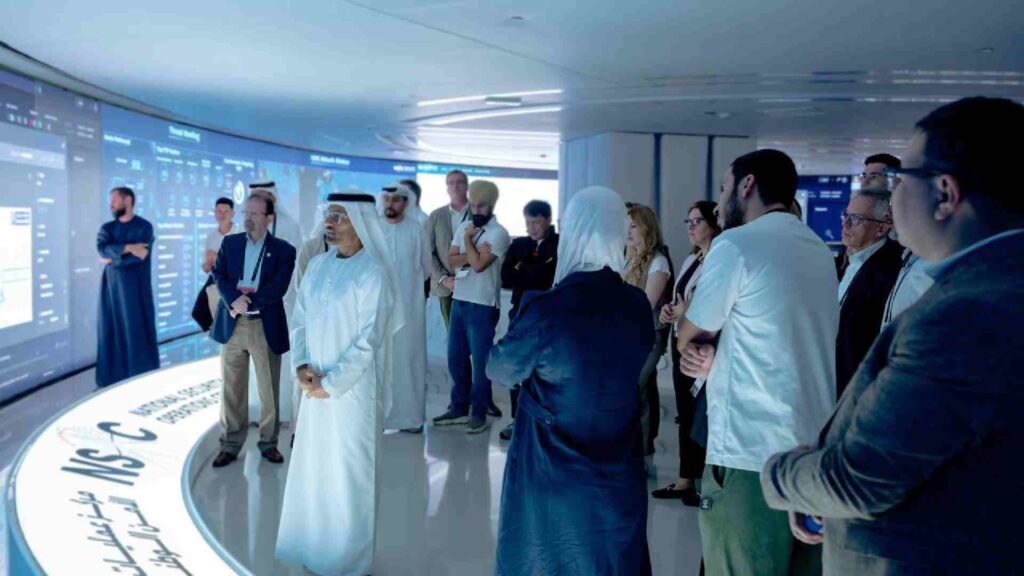Tech News
Red Hat Simplifies Workload Diversity Across the Hybrid Cloud with Latest Version of Red Hat OpenShift

Red Hat introduced new capabilities and enhancements for Red Hat OpenShift as well as the general availability of Red Hat Advanced Cluster Security Cloud Service. The new features, delivered with the general availability of Red Hat OpenShift 4.16, are designed to help organizations more easily develop, connect and enhance the security of diverse workloads for a more consistent experience across applications and environments.
Delivering better experiences and driving customer satisfaction are at the center of most organization’s IT goals. To do so, they frequently look to intelligent apps, including both AI-enabled applications and edge applications, that allow for insights to be delivered more quickly wherever they are needed. The technology decisions made today around these applications, and more are often in support of setting organizations up for an AI and edge-focused future. However, it’s not as simple as purely adopting the latest AI technology, as those systems and platforms also need to run in harmony with critical traditional applications and infrastructure like virtualized environments.
The latest enhancements to Red Hat OpenShift are designed to help organizations connect their disparate, diverse workloads and create a more consistent management and deployment experience, wherever an application lives across the hybrid cloud and regardless of whether the application is a traditional workhorse or built to harness AI innovation.
A modern option for virtualization
As the virtualization landscape continues to evolve, many organizations are looking to migrate existing virtualized workloads to a platform that can run virtual machines (VMs) side-by-side with modern containerized applications and serverless functions with the ability to modernize those VM-based applications when needed. Red Hat is now offering directly and through its partners a Virtualization Migration Assessment that will take organizations through a risk assessment methodology to help determine the best path forward for migration away from a legacy virtualization solution.
The latest enhancements in Red Hat OpenShift for virtualization use cases help further simplify migrating and modernizing virtualized workloads. New features include:
- Metro disaster recovery provides regional disaster recovery for virtual machines (VMs) that use storage deployed on Red Hat OpenShift Data Foundation in conjunction with Red Hat Advanced Cluster Management for Kubernetes for management.
- Hot-add CPU provides users the ability to add additional vCPU resources to a running VM in a declarative manner for improved memory density with safe memory overcommit, and enables users to more easily scale up VMs with CPU hotplug.
- Multi-cluster virtualization monitoring with Red Hat Advanced Cluster Management enables users to view all VMs across multiple Red Hat OpenShift clusters as well as collect and more quickly build reports for the VMs.
Improving the customer experience at the edge
Minimizing service downtime is paramount to delivering a quality experience for customers and is particularly important for those applications at the edge. To enhance service quality at the edge, Red Hat OpenShift 4.16, introduces a “shift left” approach with image-based updates (IBU) for single node OpenShift. Single node OpenShift users can now shift a large portion of the update process to a pre-production environment, which reduces the time spent updating at the production site. Additionally, if an update fails or the application doesn’t return to a functioning state, it can be rolled back to the pre-update state. This helps to restore service as quickly as possible, regardless of whether the update is successful or not.
Additionally, the OpenShift-based Appliance Builder is now available as a technology preview to Red Hat partners seeking to build turnkey, customized appliances with self-contained Red Hat OpenShift instances. The OpenShift-based Appliance Builder is a container-based utility that builds a disk image that includes the Agent-based Installer, which is used to install multiple Red Hat OpenShift clusters. This makes it easier to install Red Hat OpenShift at remote edge sites at scale, as it can be done with limited or no connectivity and without the need for an external registry.
Scaling workload security across the hybrid cloud
According to Red Hat’s 2024 State of Kubernetes Security Report, security issues continue to impact business outcomes, with 67% of respondents indicating that their companies delayed or slowed application development as a result of rising concerns. Additionally, the complexity of container-based Kubernetes environments is also a factor that some organizations still struggle with.
Helping organizations take a security-forward approach to building, deploying and maintaining cloud-native applications at scale, Red Hat Advanced Cluster Security Cloud Service is now generally available. Red Hat Advanced Cluster Security Cloud Service is a fully managed Kubernetes-native security cloud service that supports both Red Hat OpenShift as well as non-Red Hat Kubernetes platforms, including Amazon Elastic Kubernetes Service (EKS), Google Kubernetes Engine (GKE) and Microsoft Azure Kubernetes Service (AKS). With Red Hat Advanced Cluster Security Cloud Service, organizations can start securing workloads within minutes while scaling more easily across clouds and geographies without the additional overhead or complexities.
Tech News
Nemetschek and Saudi Facility Management Association Sign Strategic MoU to Advance Smart and Sustainable Facilities Management in Saudi Arabia

Nemetschek Arabia, part of the Nemetschek Group, one of the world’s leading software providers for the Architecture, Engineering, Construction and Operations (AEC/O) industry, has signed a strategic Memorandum of Understanding (MoU) with the Saudi Facility Management Association (SFMA) to support the advancement of the facilities management sector in the Kingdom through innovation, knowledge exchange and workforce development.
The collaboration reflects a shared commitment to supporting Saudi Arabia’s Vision 2030 by enhancing industry standards, accelerating digital transformation and building national capabilities within the facilities management ecosystem. Under the MoU, both parties will collaborate closely to exchange expertise and best practices, develop competencies and introduce advanced, technology-driven approaches to facilities management.
Key areas of cooperation include the organization of joint workshops, seminars and training programs, participation in industry exhibitions and events, and collaboration on research and development initiatives aimed at introducing innovative solutions for the FM sector. The partnership will also explore the execution of pilot projects across the public and private sectors, with a focus on smart facilities management, digital twins and data-driven operations.
In addition, Nemetschek Arabia and SFMA will work together to support sustainability initiatives, provide access to educational materials, offer technical and professional consultancy, and contribute to the development of national talent through targeted training and capacity-building programs.
Speaking on the collaboration, Yves Padrines, Chief Executive Officer of the Nemetschek Group, noted that facilities management is a critical pillar in maximizing the long-term value, sustainability and performance of the built environment. “As Saudi Arabia advances its Vision 2030 ambitions, digitalization across the full asset lifecycle, from design and construction to operations, has never been more important. Our collaboration with the Saudi Facility Management Association reflects Nemetschek’s commitment to supporting the Kingdom’s transformation by enabling smarter, data-driven facilities through open, interoperable technologies and strong industry partnerships.”
Muayad Simbawa, Managing Director of Nemetschek Arabia, added that facilities management is entering an era defined by digitalization, sustainability and intelligent operations. “This strategic collaboration with the Saudi Facility Management Association reflects our shared belief that technology, skills and collaboration are essential to unlocking the full potential of the FM sector. By combining Nemetschek’s expertise in digital twins and lifecycle solutions with SFMA’s industry leadership, we aim to support smarter assets, stronger capabilities and a more resilient facilities management ecosystem aligned with the Kingdom’s Vision 2030.”
Eng. Ayed bin Awad Al-Qahtani, Chairman of the Board of the Saudi Facility Management Association, said: “Our mission at SFMA is to set the gold standard for facility management in the Kingdom. By partnering with a global technology leader like Nemetschek, we are ensuring that our professionals have access to the most advanced tools and international expertise available. This collaboration will catalyze innovation, drive research, and, most importantly, equip our national talent with the competencies required to manage the Kingdom’s mega-projects with precision and excellence.”
The MoU underscores both organizations’ commitment to advancing the facilities management profession in Saudi Arabia and supporting the Kingdom’s transformation agenda through innovation, knowledge sharing and long-term ecosystem development.
Tech News
SHURE ANNOUNCES MICROFLEX® ADVANCE™ MXA320 TABLE ARRAY MICROPHONE

WHAT:
As part of the innovations that were on display at this year’s ISE, Shure debuted the new Microflex Advance MXA320 Table Array Microphone, in line with its enterprise collaboration portfolio expansion strategy. Featuring the same familiar industrial design as the popular MXA310 that it supersedes, it is designed to be ideal for IT and AV professionals seeking an easy to deploy, low-profile and scalable table solution. Packed with technological innovation, this next evolution of Shure’s table array microphone platform offers a reliable networked audio device with minimal out-of-the-box setup for all types of conferencing spaces.
The new MXA320 provides an improved audio experience for the end user thanks to enhanced Steerable Coverage™ Technology, ensuring clear audio capture during team meetings. Certified for Microsoft Teams and Zoom, it features onboard IntelliMix® processing, streamlined configuration through Designer software, ShureCloud compatibility, and an integrated mute button function all housed in a compact, low-profile design.
“In dynamic markets like the Middle East and Africa, the new Microflex Advance MXA320 delivers outstanding clarity and consistency that unlocks more inclusive and effective collaboration, reinforcing audio as the foundation of modern enterprise communication,” noted Yassine Mannai, associate director sales and marketing, Shure MEA.
WHEN:
The new Microflex Advance MXA320 Table Array Microphone will be available in Spring 2026 through Shure official channel partners, including the Middle East and Africa regions
WHERE:
Shure’s Microflex Advance MXA320 Table Array Microphone was showcased for the first time at ISE 2026, February 3rd – 6th in Barcelona. Booth #3M300. For more information, contact your Shure sales representative.
Tech News
POLYNOME AI ACADEMY AND ABU DHABI SCHOOL OF MANAGEMENT EXPAND CAIO PROGRAM, TAP GLOBAL TECH LEADERS

Polynome AI Academy and ADSM have unveiled the expanded global list of instructors for the second cohort of their Executive Program for Chief AI Officer (CAIO), featuring leaders from NVIDIA, Mubadala, BCG, G42, AI71, and leading research institutions.
The intensive program, running April 10–21, in Abu Dhabi, was created in response to a growing need among governments and large enterprises for structured AI leadership. It aims to equip Chief AI Officers and senior executives with the governance frameworks, operating models, and decision-making structures required to lead AI at both organizational and national scale.
“The first cohort confirmed what we’ve long believed: the CAIO role requires a dedicated program built for the realities of leading AI at scale,” said Alexander Khanin, Founder of Polynome Group. “Executives came to Abu Dhabi and left with actionable strategies they are already putting into practice. The tools are ready, and by 2027, AI is expected to guide half of all business decisions. The focus now is on equipping organizations with the framework to confidently execute AI-driven decisions. Cohort 2 builds on this momentum with a refined curriculum and fresh global perspectives.”
“The first cohort demonstrated the demand we anticipated; top executives across the region recognize that AI strategy cannot simply be delegated,” commented Dr. Tayeb Kamali, Chairman of Abu Dhabi School of Management. “The program continues to evolve, providing an immersive experience that equips leaders with the skills and insights to navigate AI adoption successfully and translate technological potential into real business impact.”
Inaugural Cohort: Impact & Insights
The first Executive Program for Chief AI Officer, held in November 2025 at Abu Dhabi School of Management, enrolled 35 C-suite executives and senior technology leaders. Participants completed 10 modules covering AI strategy, sovereign AI infrastructure, governance frameworks, agentic systems, Arabic NLP, AI investment strategy, and enterprise deployment methodology — combined with site visits to the UAE Cybersecurity Council, Core42’s Khazna Data Centers, and ADNOC, as well as executive roundtables with policymakers.
“The Executive Chief AI Program is unlike any course I’ve attended,” said Dr. Noura AlDhaheri, Chairman, DNA Investments. “It brings us directly to the AI creators, experts, and leaders, giving insight into the real challenges and the evolving landscape of AI. One of the most important lessons is that this field is constantly changing, so we must continually reinforce our knowledge and update our teams. AI is set to transform the way we do business; it’s a truly historic moment, and staying ahead is essential.”
The Global AI Experts Driving Cohort 02
The confirmed instructors list for Cohort 02 brings together leading voices from across the global AI ecosystem, spanning sovereign investment, national-scale AI architecture, enterprise strategy, and frontier research. Among confirmed instructors are Dr. George Tilesch, Founder & President of PHI Institute for Augmented Intelligence; Dr. Andrew Jackson, Group Chief AI Officer at G42; Prof. Merouane Debbah, Professor & 6G Lab Director at Khalifa University; Prof. Nizar Habash, Professor at New York University Abu Dhabi; Dr. John Ashley, Chief Architect at AI Nations and Director of NVIDIA AI Technology Centers; Charbel Aoun, Smart City & Spaces Director – EMEA at NVIDIA; Jean-Christophe Bernardini, Partner & Managing Director at Boston Consulting Group (BCG); Faris Al Mazrui, Head of Technology at Mubadala Investment Company; Chiara Marcati, Chief AI Advisory and Business Officer at AI71; Jorge Colotto, Founder and CEO of AIdeology.ai. Additional instructors will be announced in the coming weeks; and Marco Tempest, Director of Innovation Hub at ETH Zürich.
Program Structure
The Executive Program for Chief AI Officer is a 10-day intensive comprising 10 modules, executive seminars, case labs, operating model workshops, site visits to UAE AI institutions, including Core42’s Khazna data center, policymaker roundtables, and lifetime access to the CAIO alumni network. The program is designed for CAIOs, CTOs, CIOs, CISOs, public sector advisors, and senior digital transformation executives.
-

 Tech News2 years ago
Tech News2 years agoDenodo Bolsters Executive Team by Hiring Christophe Culine as its Chief Revenue Officer
-

 VAR10 months ago
VAR10 months agoMicrosoft Launches New Surface Copilot+ PCs for Business
-
News10 years ago
SENDQUICK (TALARIAX) INTRODUCES SQOOPE – THE BREAKTHROUGH IN MOBILE MESSAGING
-

 Tech Interviews2 years ago
Tech Interviews2 years agoNavigating the Cybersecurity Landscape in Hybrid Work Environments
-

 Tech News7 months ago
Tech News7 months agoNothing Launches flagship Nothing Phone (3) and Headphone (1) in theme with the Iconic Museum of the Future in Dubai
-

 VAR1 year ago
VAR1 year agoSamsung Galaxy Z Fold6 vs Google Pixel 9 Pro Fold: Clash Of The Folding Phenoms
-

 Tech News2 years ago
Tech News2 years agoBrighton College Abu Dhabi and Brighton College Al Ain Donate 954 IT Devices in Support of ‘Donate Your Own Device’ Campaign
-

 Automotive1 year ago
Automotive1 year agoAGMC Launches the RIDDARA RD6 High Performance Fully Electric 4×4 Pickup









